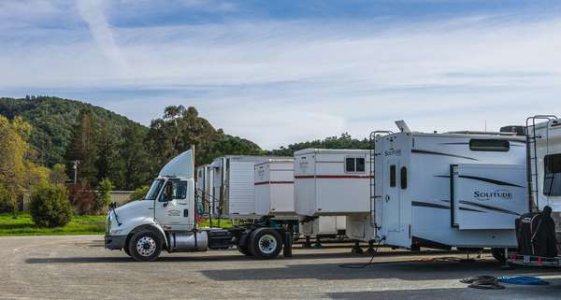Truckers Everywhere Are Applauding This Caravan Driver's Unexpected Move on the Highway – Find Out Why!
By
Danielle F.
- Replies 0
The open road in Australia can be a place of camaraderie and mutual respect among those who traverse its vast expanses. This was beautifully illustrated in a recent incident that has truckers and road safety advocates alike singing the praises of one considerate caravan driver. The simple yet impactful gesture not only made the day of a truck driver named Ben but also set a shining example for road users everywhere.
Ben was driving along a remote two-lane highway when he found himself behind a caravan. In a world where road rage and impatience are all too common, what happened next was a breath of fresh air. The caravan driver reached out to Ben via ultra high frequency (UHF) radio—a tool that's proving to be an unsung hero on the highways.

'Just let us know when you want to go and we'll back down OK,' the van driver's voice crackled through the radio, a clear invitation for Ben to overtake when safe. The truckie's response, 'Good on you mate, much appreciated,' was filled with genuine gratitude. After a brief wait for passing cars, the caravan slowed, allowing Ben to safely overtake. 'Good on you mate, you have a good day. Thanks very much for that,' Ben said, concluding the courteous exchange.
This moment of road etiquette was captured on video and has since gone viral, resonating with nearly two million viewers online. It's a prime example of how simple communication can enhance safety and cooperation on the road. 'Isn't life easier when road users just use common sense,' commented one viewer, while another emphasised the importance of UHF radios for caravanners, urging them to follow the considerate driver's lead.
The sentiment is echoed by experts like Gary Gardiner from Total Towing Setups, who 'highly recommends' the use of UHF radios on highways. He points out the dangers of a truck tailgating a caravan for long stretches, which could lead to risky overtaking manoeuvres. The ability to communicate can prevent such scenarios, ensuring both parties understand each other's intentions and can coordinate movements safely.
Gaye, a 70-year-old full-time traveller and remote worker, couldn't agree more. She considers a UHF radio and a personal locator beacon as the two essential items for caravanners. With a dedicated channel for caravanners and another for truck drivers, she often tunes into the truckers' channel, valuing their road knowledge. Gaye's own experiences highlight the practical benefits of UHF radios, from coordinating overtaking with truck drivers to being alerted about issues with her vehicle by fellow travellers.
The story of Ben and the thoughtful caravan driver is more than just a feel-good moment; it's a call to action for all road users to adopt a more considerate and communicative approach to driving. It's about recognising that, despite the solitary nature of long-distance travel, a sense of community can thrive on the open road.

At the Seniors Discount Club, we understand that many of our members are avid caravanners or have spent years behind the wheel. We encourage you to share your own experiences with road communication and how it has impacted your travels. Have you used a UHF radio on your journeys? What other tips do you have for fostering a safer and more cooperative driving environment? Let's continue the conversation and spread the word about the importance of good road manners and communication.
Ben was driving along a remote two-lane highway when he found himself behind a caravan. In a world where road rage and impatience are all too common, what happened next was a breath of fresh air. The caravan driver reached out to Ben via ultra high frequency (UHF) radio—a tool that's proving to be an unsung hero on the highways.

Truck drivers commended a caravan driver for being considerate to trucks on the road. Image Credit: Pexels/Robert So
'Just let us know when you want to go and we'll back down OK,' the van driver's voice crackled through the radio, a clear invitation for Ben to overtake when safe. The truckie's response, 'Good on you mate, much appreciated,' was filled with genuine gratitude. After a brief wait for passing cars, the caravan slowed, allowing Ben to safely overtake. 'Good on you mate, you have a good day. Thanks very much for that,' Ben said, concluding the courteous exchange.
This moment of road etiquette was captured on video and has since gone viral, resonating with nearly two million viewers online. It's a prime example of how simple communication can enhance safety and cooperation on the road. 'Isn't life easier when road users just use common sense,' commented one viewer, while another emphasised the importance of UHF radios for caravanners, urging them to follow the considerate driver's lead.
The sentiment is echoed by experts like Gary Gardiner from Total Towing Setups, who 'highly recommends' the use of UHF radios on highways. He points out the dangers of a truck tailgating a caravan for long stretches, which could lead to risky overtaking manoeuvres. The ability to communicate can prevent such scenarios, ensuring both parties understand each other's intentions and can coordinate movements safely.
Gaye, a 70-year-old full-time traveller and remote worker, couldn't agree more. She considers a UHF radio and a personal locator beacon as the two essential items for caravanners. With a dedicated channel for caravanners and another for truck drivers, she often tunes into the truckers' channel, valuing their road knowledge. Gaye's own experiences highlight the practical benefits of UHF radios, from coordinating overtaking with truck drivers to being alerted about issues with her vehicle by fellow travellers.
The story of Ben and the thoughtful caravan driver is more than just a feel-good moment; it's a call to action for all road users to adopt a more considerate and communicative approach to driving. It's about recognising that, despite the solitary nature of long-distance travel, a sense of community can thrive on the open road.
Key Takeaways
- A truck driver named Ben praised the behaviour of a caravan driver on an Australian highway for using UHF radio communication.
- The caravan driver contacted Ben to coordinate a safe overtaking manoeuvre, which was appreciated and viewed as an example of good road etiquette.
- Experts and experienced travellers recommend the use of UHF radios for better communication and safety on the roads, especially between caravanners and truck drivers.
- There's a dedicated UHF radio channel for caravanners, but many prefer to stay on the truck drivers' channel for up-to-date information on road conditions.







